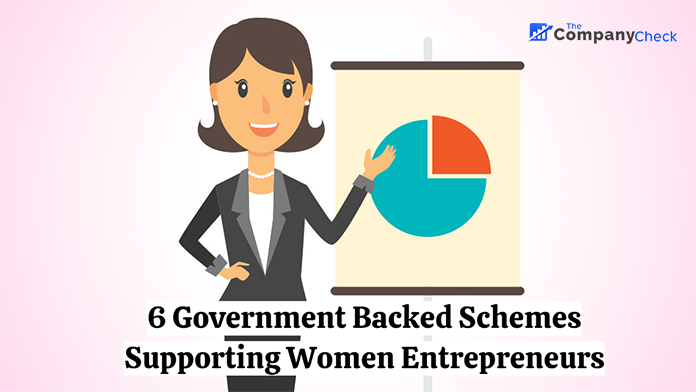There is an expanding pool of women entrepreneurs filling in as good examples for the younger generation. However, this number is little, compared to male entrepreneurs who are ruling the startup ecosystem. Probably the biggest reasons why women lose track is the lack of support and financial investment, making them drop out of the race much earlier.
The MAKERS India report on the State of Women in Tech Entrepreneurship in India highlights the requirement for more to be done when it comes to investment in women entrepreneurs, particularly those in the tech field. According to the discoveries, women founded and co-founded several startups account for less than six percent of the total investments injected into the Indian startup ecosystem. Additionally, the funding raised by Indian startups with at least one woman founder accounted for just 5.77 percent or $1.69 billion (across 378 deals) of the total startup investments in India for January 2018 to June 2020.
6 Government Backed Scheme Supporting Women Entrepreneurs
There are some government-backed schemes that give wings to aspiring women entrepreneurs, both from urban and rural areas of the country.
Bharatiya Mahila Bank
This initiative was introduced by then-Prime Minister Manmohan Singh in 2013, on the birth commemoration of the country’s first female Prime Minister, Indira Gandhi. Bhartiya Mahila Bank is India’s first ladies bank, under the State Bank of India, that rotates around the financial requirements of women. The bank disburses loans of up to Rs 20 crores for manufacturing units. The Credit Guarantee Fund Trust for Micro and Small ventures additionally offer collateral-free loans up to Rs 1 crore, along with a reimbursement period of seven years. The basic interest rate offered is 10%, whereupon 2% extra premium is added making it 12%, making it a lucrative scheme for women entrepreneurs. Women aged 21 to 70 are eligible for this scheme.
Stree Shakti Scheme
This women-centric scheme introduced by the Central Government is under the flagship of the State Bank of India. Tailored for aspiring women entrepreneurs, this scheme additionally covers those women entrepreneurs who have a shared capital of 51% as partners, shareholders or directors of a private company. The scheme offers a credit of up to Rs 50 lakhs, yet the rate of interest is subject to the current rate of time of availing a loan. A concession of 0.5% is given if the loan amount surpasses Rs. 2 lakh. The debtor should claim half of the venture she is availing the loan on.
Annapurna Scheme
As the name proposes, the central government-sponsored Annapurna Scheme offers loans to women entrepreneurs in the food sector. They can own restaurants, catering businesses, or any other food-related enterprises. Women can use the loan amount of up to Rs 50,000 to purchase the kitchen equipment or new utensils needed for their initiative. The repayment span of the loan is three years, and it tends to be reimbursed in 36 installments. A grace period of one month is given for the repayment of the loan after it is sanctioned to the debtor. The interest rate depends on market rates.
Dena Shakti Scheme
This scheme was launched by the central government under the aegis of Dena Bank and offers advances to those women entrepreneurs who are involved in manufacturing, retail stores, micro-credit, and agricultural businesses. The maximum amount of loan is Rs 20 lakhs, while for microcredit, the loan amount is Rs 50,000. A relaxation of 0.25% is given on the overall market loan fee. The plan is available to those business people who own over half stake in the organization.
Mudra Yojana Scheme For Women
This scheme offers monetary help to those entrepreneurs who offer types of assistance like tuition classes, run tailoring centers or a beauty parlor, among others. Through the Mudra Yojana Scheme for Women, small scale enterprises and groups of women who seek to begin their cooperative are benefitted. The forte of this loan is that it doesn’t need any collateral support, and is delineated into three classes of acquisition:
- Shishu – a loan of Rs 50,000 can be used by those, who are in the beginning phase of their business.
- Kishor – The loan amount, in the range of Rs 50,000 – Rs 5 lakh, can be availed by established businesses.
- Tarun – Those who need to scale their tasks, can avail a loan of Rs 10 lakhs. A mudra card is given to the debtor and looks like a Mastercard, the constraint of which is set to 10% less than the granted loan.
Cent Kalyani Scheme
This scheme, introduced by the Central Bank of India, aims to help women who work with SMEs and in the agricultural field. This scheme can also be availed by village women, who are independently employed or even work in cottage industries. Under the Cent Kalyani Scheme, women involved in sections like handloom weaving, food-processing and handiwork, are totally covered. A maximum loan of Rs. 100 lakhs can be given, and no collateral is required. Loan costs are reliant on the current market rate.
For more information, visit the website of The Companycheck



